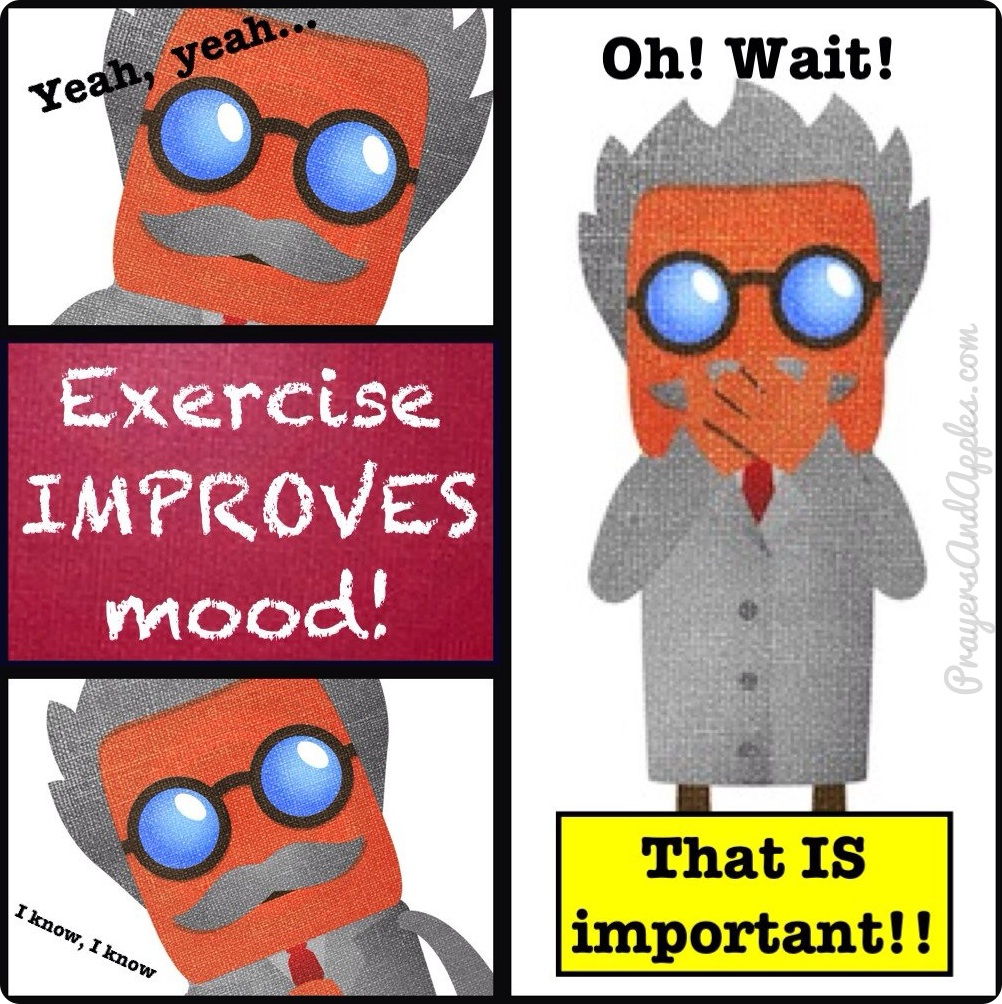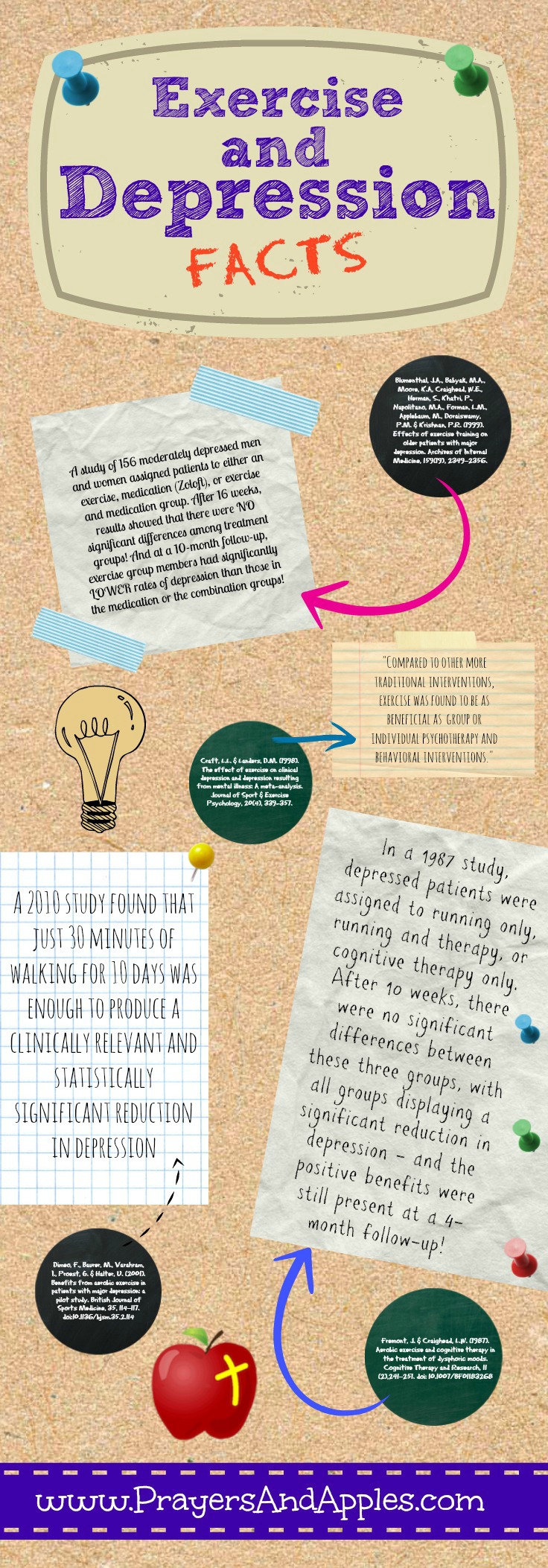
Just 30 minutes of walking for 10 days was enough to produce a clinically relevant and statistically significant reduction in depression (Dimeo, Baurer & Varahra, 2001).
Exercise improves mood. And, in other news: the sky is blue.
Between all the P90X commercials, Zumba classes and magazine covers (look how happy Gwyneth Paltrow is because she makes millions and is married to a rockstar works out!) I think we all get it: exercise makes you feel better. (Totally not hating on Gwynnie, by the way – she’s all about holistic health, which you know I love!) I’m just saying, the whole “exercise and be happy” message has been so overplayed in the media that I think we’ve lost sight of just how significant those words really are.
Just like its effect on energy, exercise impacts mood in a major way. And when I say major, I mean multiple studies have shown exercise to be just as effective at relieving depression as antidepressants and cognitive therapy. So this is probably something we should look at a little closer:
The cool stuff
A 1999 study assigned 156 moderately depressed men and women to an exercise, medication, or exercise and medication group. Those in the exercise group walked or jogged on a treadmill for 30 minutes 3 times per week for 16 weeks. Those in the medication group received sertraline (Zoloft). Those in the combination group received both medication and exercise. Results showed that while medication worked more quickly to reduce symptoms of depression, there were no significant differences among treatment groups at 16 weeks. And get this: A 10-month follow-up revealed that exercise group members had significantly lower rates of depression than those in the medication or the combination groups (Blumenthal et al., 1999, as discussed in Craft & Perna, 2004).
And here’s one for my runners: Participants in a 1987 study were randomly assigned to running only, running and therapy, or cognitive therapy only. The treatment was 10 weeks in length. The running group met 3 times per week and exercised for 20 minutes per session. Those in the therapy-only group met with a therapist for 60 minutes once a week. Those in the combination group received 10 individual sessions with a therapist and also ran 3 times per week. When all was said and done, there were no significant differences between these three groups, with all groups displaying a significant reduction in depression, and the positive benefits were still present at the 4-month follow-up (Fremont & Craighead, 1987, as discussed in Craft & Perna, 2004).
Just the study quotes, please
While individual studies like the ones above make for great headlines, it’s important to delve deeper into the research and make sure there’s actually a body of evidence to back up such flashy claims. Lucky for us, there is! A few quotes:
- The Benefits of Exercise for the Clinically Depressed (Craft & Perna, 2004), a review of exercise and mood studies published between 1996-2003:
The mechanisms underlying the antidepressant effects of exercise remain in debate; however, the efficacy of exercise in decreasing symptoms of depression has been well established.
…it is interesting to note that while depression may be an additional risk factor for exercise noncompliance, reported drop-out rates among depressed patients are not too different from those in the general population.
With increasing evidence to support the efficacy of this behavioral intervention in reducing symptoms of depression, we encourage primary care providers to recommend exercise involvement to their depressed patients.
- The Effect of Exercise on Clinical Depression and Depression Resulting from Mental Illness: A Meta-Analysis (Craft & Landers, 1998), a review of 30 studies from 1978-1996:
Compared to other more traditional interventions, exercise was found to be as beneficial as group or individual psychotherapy and behavioral interventions.
- The Acute Effects of Exercise on Mood State (Yeung, 1996), a review of 81 studies from 1976-1995:
Over 85% of these studies found at least some degree of improved mood, that is, the results were either positive or mixed, on a wide variety of measures following exercise, despite a diversity of exercise modes, durations and intensities.
In general, the mood effects of exercise occur irrespective of either gender or age […] Neither does physical disability preclude the experience of mood enhancement following exercise.
…there is strong support for the existence of acute mood benefits derived from a single bout of exercise. This suggests that exercise may be a valuable short-term strategy for the self-regulation of mood in both distressed and normal subjects.
A word to the wise…
I’m looking forward to sharing more exercise and mood information over the next few weeks! But in the meantime, I wanted to close with this quote from Craft & Perna (2004):
While this discussion is not meant to argue against the use of antidepressant medication or psychological therapies, there is strong evidence to advocate the use of exercise as a potentially powerful adjunct to existing treatments.
I would love to hear your thoughts on this research!
And for all my Pinterest friends, here’s a lil infographic:
References
Blumenthal, J.A., Babyak, M.A., Moore, K.A, Craighead, W.E., Herman, S., Khatri, P., Napolitano, M.A., Forman, L.M., Applebaum, M., Doraiswamy, P.M. & Krishnan, P.R. (1999). Effects of exercise training on older patients with major depression. Archives of Internal Medicine, 159(19), 2349–2356.
Craft, L.L. & Landers, D.M. (1998). The effect of exercise on clinical depression and depression resulting from mental illness: A meta-analysis. Journal of Sport & Exercise Psychology, 20(4), 339-357.
Craft, L.L. & Perna F.M. (2004). The benefits of exercise for the clinically depressed. Primary Care Companion to the Journal of Clinical Psychiatry, 6(3), 104-111.
Dimeo, F., Baurer, M., Varahram, I., Proest, G. & Halter, U. (2001). Benefits from aerobic exercise in patients with major depression: a pilot study. British Journal of Sports Medicine, 35, 114–117. doi:10.1136/bjsm.35.2.114
Fremont, J. & Craighead, L.W. (1987). Aerobic exercise and cognitive therapy in the treatment of dysphoric moods. Cognitive Therapy and Research, 11(2),241–251. doi: 10.1007/BF01183268
Yeung, R.R. (1996). The acute effects of exercise on mood state. Journal of Psychosomatic Research, 40(2),123-141. doi: 10.1016/0022-3999(95)00554-4



All I can say is I am one happy person when I run!
I always feel better when I exercise…not sure why I don’t do it more often. Good article, Jessie!
Thanks! I know, it’s so hard to find the time/get motivated to start a workout, but afterwards you feel amazing! :)
Hi there, i read your blog from time to time and i own a similar one and i was
just wondering if you get a lot of spam comments?
If so how do you prevent it, any plugin or anything you can advise?
I get so much lately it’s driving me crazy so any help is very much appreciated.
Hi, thanks for reading! I use Akismet – hope that helps :)